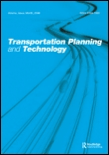
TRANSPORTATION PLANNING AND TECHNOLOGY
Scope & Guideline
Exploring Innovations in Transportation Systems
Introduction
Aims and Scopes
- Transportation Planning:
Emphasizes the integration of land use and transportation systems to enhance mobility and accessibility while considering sustainability and environmental impacts. - Emerging Transportation Technologies:
Explores the implications of new technologies such as connected and automated vehicles (CAVs), electric vehicles (EVs), and intelligent transportation systems on transportation networks and policies. - Sustainable Mobility Solutions:
Focuses on innovative approaches to promote sustainable transportation modes, including public transit, bike-sharing, and pedestrian-friendly infrastructure. - Behavioral Analysis and User Experience:
Investigates the factors influencing user behavior and perceptions regarding various transportation options, employing methodologies such as surveys, machine learning, and behavioral modeling. - Equity and Accessibility in Transportation:
Addresses social equity issues related to transportation access, particularly for vulnerable populations, and evaluates the impacts of transportation policies on different demographic groups. - Data-Driven Decision Making:
Utilizes advanced data analytics, modeling, and simulation techniques to inform transportation planning and policy decisions.
Trending and Emerging
- Smart Mobility and Autonomous Systems:
Research on smart mobility solutions, particularly involving autonomous vehicles and their integration into existing transport systems, is gaining traction as technology evolves. - Sustainability and Climate Resilience:
There is a growing focus on sustainable transportation practices and policies that address climate change, including the adoption of electric and shared mobility solutions. - Data Analytics and Machine Learning Applications:
The use of advanced data analytics and machine learning techniques to improve transportation planning, demand forecasting, and operational efficiency is increasingly prominent. - User-Centered Design and Equity:
Research emphasizing user experience, behavioral intentions, and equitable access to transportation services is emerging as a critical area of interest. - Impact of COVID-19 on Travel Behavior:
Studies examining the lasting effects of the COVID-19 pandemic on travel patterns, preferences, and the overall transportation landscape are trending. - Integration of Land Use and Transportation Planning:
There is a renewed emphasis on the interrelationship between land use and transportation systems, particularly in the context of urban development and sustainability.
Declining or Waning
- Traditional Transportation Modes:
There is a noticeable decrease in research focusing solely on traditional modes of transport, such as buses and taxis, as the emphasis shifts towards innovative and sustainable alternatives. - Static Traffic Management Approaches:
Research on static traffic management techniques is waning, with a growing preference for dynamic and adaptive systems that leverage real-time data and technology. - Conventional Transportation Policies:
The exploration of conventional transportation policies without incorporating technology or sustainability perspectives has declined, reflecting a shift towards more integrated and forward-thinking policy frameworks. - Single-Modal Studies:
Studies focusing on single modes of transportation are becoming less common, as there is a trend towards multimodal analysis that considers the interactions between different transportation systems. - Infrastructure-Centric Approaches:
Research that primarily addresses infrastructure development without considering user behavior, technology integration, or sustainability factors is witnessing a decrease.
Similar Journals

Frontiers in Future Transportation
Driving Innovation in MobilityFrontiers in Future Transportation, published by FRONTIERS MEDIA SA, is an influential Open Access journal that has been at the forefront of research since its inception in 2020. With an ISSN of N/A and E-ISSN 2673-5210, this journal provides a comprehensive platform for cutting-edge studies in the field of transportation, encompassing urban studies, automotive engineering, and innovative control systems. Ranking impressively in Scopus with notable percentiles—61st in Urban Studies, 51st in Automotive Engineering, and others—it underscores its significance within the scholarly community. The journal is committed to advancing the discourse surrounding sustainable and smart transportation solutions that address the challenges of future mobility. By offering unrestricted access to research, it invites contributions from researchers, professionals, and students alike, fostering collaboration and disseminating knowledge pivotal to transforming transportation systems globally. With its headquarters based in Lausanne, Switzerland, Frontiers in Future Transportation is poised to make substantial contributions to the evolving landscape of transport research through 2024 and beyond.
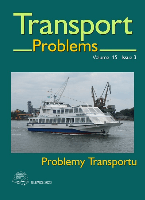
Transport Problems
Driving Knowledge Forward in Automotive and Mechanical EngineeringTransport Problems, published by the Silesian University of Technology, Faculty of Transport, is a distinguished open-access journal that has been advancing scholarship in the fields of Automotive Engineering, Mechanical Engineering, and Transportation since its inception in 2007. With an ISSN of 1896-0596 and an E-ISSN of 2300-861X, this journal serves as a vital platform for researchers and practitioners to disseminate innovative research findings and explore fundamental issues in transport systems and technologies. Based in Poland, the journal covers various topics including transportation logistics, vehicle dynamics, and environmental impacts, thereby addressing critical challenges faced in the transportation sector globally. As reflected in its Scopus rankings, the journal occupies respectable quartiles and continues to contribute valuable insights to the academic community. By making its content freely accessible, Transport Problems significantly enhances the ability of researchers and students alike to engage with the latest developments in transport engineering and contribute to this ever-evolving field.
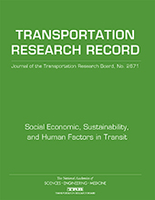
TRANSPORTATION RESEARCH RECORD
Shaping Policy Through Cutting-Edge ResearchTRANSPORTATION RESEARCH RECORD is a premier journal published by SAGE PUBLICATIONS INC, focusing on the latest advancements and research in the fields of civil and structural engineering as well as mechanical engineering. Since its inception in 1974, this journal has become an essential platform for disseminating innovative methodologies, case studies, and comprehensive reviews that address critical issues in transportation systems and infrastructure. With a respectable Q2 ranking in both engineering categories as of 2023, it solidifies its position among reputable publications, catering to a diverse range of scholars, professionals, and students. The journal not only facilitates access to high-quality research but also plays a pivotal role in shaping policy and practice through its robust findings. For those invested in the engineering disciplines, particularly within the transportation domain, TRANSPORTATION RESEARCH RECORD is an invaluable resource, with a wide array of topics covered throughout converged years, from 1974 to 1990, and from 1993 to 2024, ensuring a comprehensive exploration of historical and contemporary challenges in transportation.
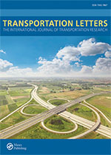
Transportation Letters-The International Journal of Transportation Research
Bridging theory and practice in transportation studies.Transportation Letters - The International Journal of Transportation Research, published by Taylor & Francis Ltd, is a leading journal dedicated to advancing the field of transportation studies. With an impact factor that reflects its significance within the academic community and a prestigious ranking of Q2 in Transportation, this journal provides a critical forum for the dissemination of innovative research and insights in transportation systems, policies, and technologies. Covering a broad scope of topics from urban mobility to logistics and infrastructure, Transportation Letters serves as an essential resource for researchers, professionals, and students aiming to deepen their understanding of transportation issues facing society today. With over a decade of publication since 2009, the journal has established a solid reputation, ranking 46th out of 141 in Scopus's transportation category, placing it in the 67th percentile. Although it does not operate under an open-access model, it remains committed to accessibility through various subscription options, ensuring that vital research is available to those shaping the future of transportation.

Journal of Urban Mobility
Navigating the Complexities of Urban MobilityThe Journal of Urban Mobility, published by ELSEVIER, is a premier open access journal dedicated to advancing the understanding of urban transportation dynamics. Since its inception in 2021, this journal has focused on addressing the complexities of mobility within urban settings, encompassing areas of geography, planning, and transportation. With an ISSN of 2667-0917, it attracts considerable attention, as evidenced by its Scopus rankings—positioned at #311 in the Geography, Planning and Development category and #77 in Transportation. The Journal aims to foster interdisciplinary dialogue, offering researchers, professionals, and students a platform for disseminating innovative studies and policy analyses that shape the future of urban mobility. Accessible through a comprehensive open access model, it ensures a wide reach and impact, making significant contributions to the field until at least 2024.

Revista de Transporte y Territorio
Bridging Research and Practice in Transportation StudiesRevista de Transporte y Territorio is a prominent academic journal published by the University of Buenos Aires, Institute of Geography, dedicated to the study of transportation systems and territorial dynamics. With its ISSN 1852-7175, this journal serves as a crucial platform for disseminating cutting-edge research and innovative practices in the fields of geography, urban planning, and transportation studies. Aimed at researchers, professionals, and students alike, the journal seeks to foster dialogue and understanding of the interrelationships between transportation and territorial development, providing insights into sustainable solutions for contemporary mobility challenges. Although currently not designated as Open Access, the journal is committed to high academic standards, ensuring that all published works undergo rigorous peer review. Situated in Buenos Aires, Argentina, the Revista de Transporte y Territorio not only highlights regional issues but also contributes to the global discourse on transportation and territory.

TRANSPORTATION
Illuminating Pathways in Transportation ScienceTRANSPORTATION is a premier academic journal published by Springer, focusing on the dynamic and interdisciplinary field of transportation studies. Established in 1972 and set to release its latest findings through 2024, the journal has garnered a strong reputation, reflected in its impressive impact factor and Q1 quartile rankings across key categories including Civil and Structural Engineering, Development, and Transportation. With a robust Scopus ranking that places it in the top percentile of its fields (ranked #16/306 in Social Sciences - Development, #27/379 in Engineering - Civil and Structural Engineering, and #23/141 in Social Sciences - Transportation), "TRANSPORTATION" is crucial for researchers, professionals, and students alike who seek to expand their understanding of innovative transport systems, policies, and technologies. By offering in-depth research articles, reviews, and case studies, the journal serves as a vital resource for advancing academic knowledge and practical solutions in the transportation sector. Part of a thriving academic community, contributors and readers alike are encouraged to engage with the latest research to foster development in pressing issues related to mobility and infrastructure.
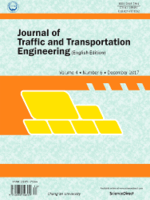
Journal of Traffic and Transportation Engineering-English Edition
Empowering Knowledge in Civil and Structural Engineering.Journal of Traffic and Transportation Engineering-English Edition, published by KEAI PUBLISHING LTD, is a leading open-access journal that has been disseminating valuable research in the realms of civil and structural engineering, as well as transportation studies since 2014. With a robust impact factor reflected by its prestigious Q1 rankings in both Civil and Structural Engineering and Transportation, this journal stands at the forefront of innovation and scholarship, featuring contributions from experts across the globe. The journal is particularly noted for its practical and theoretical advancements in traffic and transportation engineering, making it indispensable for researchers, industry professionals, and students aiming to deepen their understanding of these critical fields. Dedicated to providing a platform for high-quality interdisciplinary research, the Journal of Traffic and Transportation Engineering embraces the principles of open access, ensuring that all published articles are freely available to foster knowledge sharing and collaboration within the community. With its headquarters located in Beijing, China, the journal continues to push boundaries and set new standards in the field of traffic and transportation research.

TRANSPORTATION RESEARCH PART C-EMERGING TECHNOLOGIES
Shaping the Next Generation of Transportation InsightsTRANSPORTATION RESEARCH PART C - EMERGING TECHNOLOGIES is a leading journal dedicated to the exploration and dissemination of innovative solutions in the field of transportation. Published by PERGAMON-ELSEVIER SCIENCE LTD in the United Kingdom, this journal has been pivotal in advancing the understanding of emerging transportation technologies since its inception in 1993. With a robust impact across multiple disciplines, it proudly holds a Q1 status in key categories such as Automotive Engineering, Civil and Structural Engineering, and Computer Science Applications, underscoring its vital role in shaping research and development in these areas. Researchers and practitioners are encouraged to engage with its rich repository of knowledge, which includes rigorous peer-reviewed articles aimed at addressing contemporary challenges in the transportation sector. While it currently does not operate under an Open Access model, the journal remains an essential resource for professionals and scholars committed to the field. With an affiliation to the prestigious Scopus database, TRANSPORTATION RESEARCH PART C stands as a beacon of scholarly excellence, driving the future of transportation technologies.

Case Studies on Transport Policy
Unveiling the dynamics of transport systems through rigorous analysis.Case Studies on Transport Policy, published by Elsevier, is an influential journal in the fields of transport policy, urban studies, and geographic planning. With its ISSN 2213-624X and E-ISSN 2213-6258, this quarterly journal has consistently maintained a strong impact within its scope, attaining Q1 rankings in Geography, Planning and Development and Urban Studies, as well as a Q2 ranking in Transportation for 2023. The journal provides a platform for high-quality research and practical case studies that contribute significantly to the understanding and improvement of transport systems and policies worldwide. Its rigorous peer-review process ensures that published articles are of the highest academic standard, appealing to researchers, policy-makers, and professionals alike. With a strong presence in several social sciences categories, the journal ranks highly in Scopus, positioning itself as a critical resource for those engaged in the strategic development and analysis of transport solutions. Located in Amsterdam, Netherlands, it aims to bridge the gap between research and real-world applications, facilitating knowledge exchange and innovative strategies in transport policy.